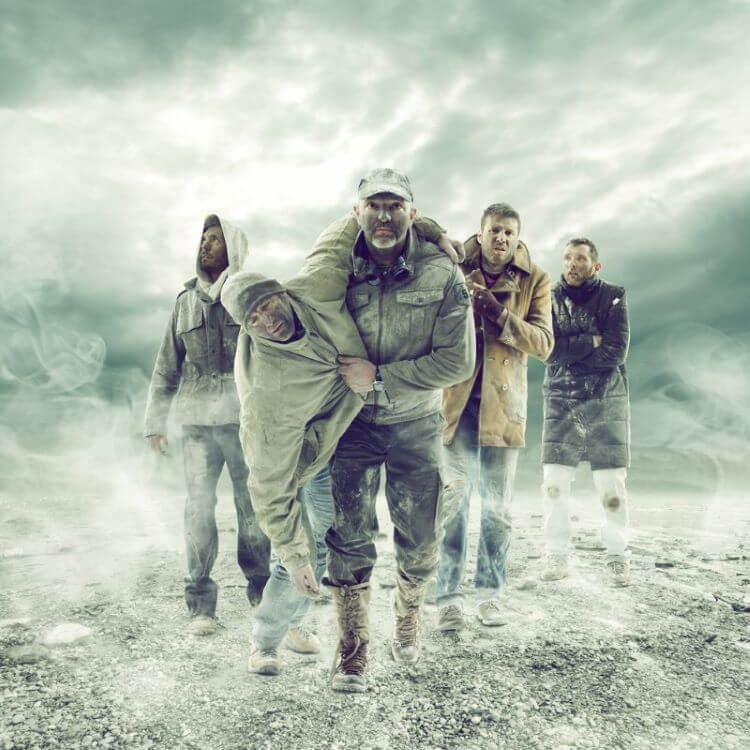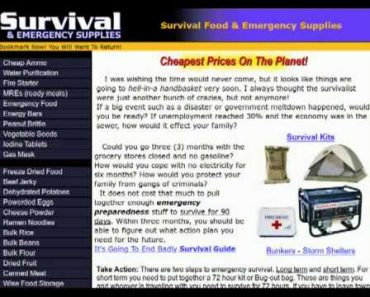A while back, I was sitting with a group of friends around the campfire discussing the day’s events after practicing outdoor survival skills almost the entire day. The discussion soon shifted towards emergency preparedness, and everyone took turns to share what they had done lately to stay prepared.
One of the new members of our group all of a sudden asked how we would get together after a major disaster. He believes that our small group has better chances of outlasting any disasters if we would come together when the time comes.
Since there are members in our group with various skills, they are socially conscious and act on their knowledge, he said it would be smart to group together. However, I told him that we would probably have no way to get together, at least not all of us.
My answer surprised him, and I had to elaborate that in the event of a disaster where we couldn’t use a car, or we couldn’t get gas or outpace the chaos in the streets, it would be better to stay put wherever we’re living and see how things develop. And this discussion wasn’t about bugging out, since all of us have a bug-out plan, but was more on the “start all over when the dust settles and start together” side.
I told him that it’s better to think globally and act locally if you want to survive in the first weeks of an SHTF event. If you are familiar with my work, you probably know by now that I always encourage people to learn more about their region and to do whatever they can to get to know their neighbors.
This should make sense for preppers because their neighbors will eventually become their families in the aftermath of a major SHTF event. You need to surround yourself with trustworthy people, and even enrolling in local CERT training or being active in the Neighborhood Watch is a good start.
Set realistic expectations
When people think about survival groups, they have all sorts of expectations and get their ideas from movies or TV shows. They want to be part of a group that covers all their needs, and they assume that after finding skilled people, putting together such a group it’s quite easy.
However, the reality of any group of adults in the aftermath of a major disaster will be more like the “Lord of the Flies” situation, and such groups will probably not last.
Also, people seem to forget that your family is the primary survival group you should count on, and you should make sure that each member of your family is strong and healthy but also somewhat self-reliant. Sometimes just involving your family members in various activities within your local community is a good start to get them prepared.
The problems of working together
Now let’s say you do manage to find people sharing the same interest, and somehow you manage to bring them together. How will you hold them together? This is one of the most difficult things to do since groups need to be led, and good leaders are hard to find.
A group might have a natural leader even if you have already appointed an elected leader to lead the flock, and their opinions will clash, leading to the separation of the group. Fractures occur when people cannot get on the same page, and the distinctive character of each individual in the group may become a problem for the leader and the integrity of the group.
Think of it like this: there are lazy people in each team/group, and even if they are part of the same team or want to become part of a certain team, they are often talkers and not doers. Having lazy and idealistic people in a survival group won’t work since their inaction, and unproductive habits will erode the group.
I have a friend living in an expats community in Chile, and he is part of a group of under 30 people. They are an international eco-living community, and even if the community is run democratically, there are always problems.
The community votes on ideas to be implemented for the group’s well-being, and then tasks are assigned based on skills and competencies. However, he often notices that work is hardly ever done for certain tasks, and some members aren’t picking up the slack. Some individuals do work, but others are pushed to follow up on their assignments only when the whole group comes together.
This creates conflicts between the members of the group, and even if they are an idealistic community, some of them get tired of doing everyone else’s work. I believe it is just a matter of time until he leaves this group.
Being ready, willing, and able
Another thing that we have to consider when discussing survival groups is that there are no two people alike in such groups, and everyone has their strengths and weaknesses. Let’s say our group does plan to meet after a major disaster to start anew somewhere else.
For one thing, the ability to put things in motion after such an event requires a certain level of mental preparation, physical fitness, and most importantly, some sort of economic autonomy. To be part of a survival group, you need to be an active and dynamic person involved in regular trying of some sort. Passive knowledge (the inability to act on what you learn) has no room in a group that needs to work and fight together for its survival.
There are many reasons groups don’t stay together, and I bet everyone out there has lost contact with some people that they thought would be part of their lives forever. Imagine having to deal with an end-of-the-world disaster that brings challenges that many folks may not even comprehend.
You cannot experience the “end of the world” by reading about it or by doing various drills that you may think will be required when the world you know ends. The only thing you could do that comes remotely close to that is to move to a country that has been ravaged by war or an unstable political system. If you would live in a country where the economy is in shambles, the infrastructure is almost nonexistent, or when someone tries to rob or kill you on a daily basis, then you would understand what survival is all about. This is out of the question for many, and they forget how good we still have it here in the United States.
We can’t predict the future, and learning new self-reliance skills is the best thing we can do to serve us well in the aftermath of a disaster. Associating ourselves with like-minded people and sharing our knowledge and worries is the next best thing we can do, but remember that there’s no telling if you can depend on that group when the time comes.
Finding like-minded people

As said previously, your duty is to continually learn and adapt to challenging situations since you want to do well, regardless of whom you will be stuck with when the brown stuff hits the fan. Regarding the “stuck with” part, I believe it’s better to find yourself in the right setting and have people around that can bring something to the table.
Being part of a group preoccupied with certain activities or engaging in events organized by groups united by the same goal is the way to go. Here are a few examples that should help you in your quest to find like-minded people.
The Neighborhood Watch
In the late 1960s, citizens from residential areas organized and took initiatives in crime prevention as the main method to deal with the increasing crime rate in their neighborhoods. It has become a nationwide program starting in the 70s and is one of North America’s best-known concepts of crime prevention.
Since there is no formal way to start a Neighborhood Watch group, you will need to go door to door and talk to your neighbors within a given area to start a group. The group you start needs to get together on a regular basis, and you need to establish who gets included and how they can help.
Even a simple step like drawing a map of the neighborhood and writing the name and phone of those who want to get included is a good start. Let’s say someone does notice something unusual, then just by having that map at hand, they will be able to know whom to call.
Add other important phone numbers on the map like the ones of the police and fire departments, the local councilman, and any other phone numbers of key contacts from your area. To find out more about how such groups work and how to organize one, you can visit NNW.org
CERT
The Community Emergency Response Team (CERT) is an initiative designed and superficially structured so that the local and state program managers have the flexibility to form programs that would serve their communities.
CERT volunteers are trained to respond to various emergency situations in their communities, but they can also assist with other non-emergency events. This program trains volunteers to prepare for various types of disasters that their community may be subjected to. If your area is prone to floods, CERT volunteers will be trained to assist the vulnerable, aid with evacuation, and so on.
Not only do they learn how to safely respond to disasters (natural or man-made), but they also promote preparedness by participating in various community events. I recommend attending classes organized by your local CER program since you will always find something new to learn and will certainly meet like-minded people.
Neighborhood Community Gardens
In certain urban areas, community gardens are popping up, and they are becoming more and more popular. These local gardens bring together people driven by the desire to improve a plot of land and grow their own local food. These people are concerned about self-sufficiency and self-reliance and could be good candidates for a survival group.
Even if you may not need to use that plot to grow your own food, it’s always a good idea to attend the public events they are hosting so that you get to meet the people involved and perhaps learn something new.
Gun Clubs
Firearms will come into play in just about any serious disaster scenario we can think of since these tools are part of our lives. Just about every city has a gun club and a firing range with people teaching firearm classes.
Visit some of these places and see what classes are held and what kind of topics are taught. Even if you have a lot of experience with firearms, there’s always something you can learn from taking a class. Join the local gun club and get to know the people. Sometimes, these gun clubs often range discounts and other benefits as well, besides providing you with the opportunity to meet like-minded people.
Camping and outdoors groups
I love being part of various outdoor groups because they can provide camping and backpacking teaching and organize outdoor trips in various regions. These socially based groups allow you to meet other people in your area who share the same interests.
While some of these groups won’t have prepper or survivalist members, they do provide you with great opportunities to discover your area and learn new things from more experienced outdoor enthusiasts.
Concluding
Now that you know where to find like-minded people to start your own survival group or become part of an established group, it’s time for you to put in some effort to know the people in those groups. Bonding and creating relationships is perhaps the hardest thing to do since life is very dynamic, and you need to be willing to give everyone a chance.
Keep an open mind regardless of whom you interact with, and who knows; maybe you will find another survival “family”. One that will probably be there for you when things go south.




























